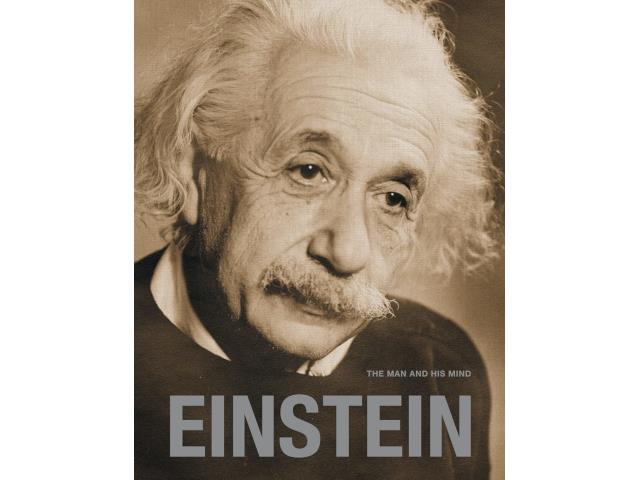(MENAFN- ForPressRelease) New York City, NY, USA, July 8, 2023 -- It's been one hundred years since Albert Einstein gave his Nobel Prize lecture titled Fundamental Ideas and Problems of the Theory of Relativity, on July 11th, 1923. The centennial of this event is a reminder of the remarkable history of Einstein's Nobel Prize and the address. Now, a book is available chronicling the life of the renowned physicist.
Titled Einstein: The Man and His Mind, the one-of-a-kind, hard-cover, 4.4-pound book contains rarely seen photos of Einstein, as well as beautifully preserved letters, manuscripts, journals and even equations written in Einstein's hand. The book helps place in historical context his ideas about time, gravity, quantum theory and cosmology. It's for sale on Amazon, for $51.99 (new).
The book comprises an astounding private collection of Einstein memorabilia owned by Dr. Gary Berger, with annotations and commentary by Dr. Berger and his two co-authors: Michael DiRuggiero (owner of Manhattan Rare Book Company in New York City) and Dr. Hanoch Gutfreund (a physicist at Hebrew University of Jerusalem who also wrote the book's foreword).
“This book is fascinating reading for people interested in scientist biographies,” said Mr. DiRuggiero, whose inventory at Manhattan Rare Book Company contains many Einstein items for sale. These can be seen on his website, He added,“It's also an exquisite photo research opportunity for scholars of the history and philosophy of physics.”
From today's perspective, one might think the most acclaimed scientist since Isaac Newton would have won a Nobel Prize for the theory virtually synonymous with his name – relativity. But this did not happen, according to Dr. Berger, in his essay titled Einstein's Nobel Prize Address Centennial.“The path to the Nobel Prize was anything but smooth,” Dr. Berger said.
“The Royal Swedish Academy of Sciences had repeatedly rejected Einstein as a Nobel Prize recipient despite his sixty nominations, most of them for relativity, over a decade,” Dr. Berger wrote.“In 1921, the Committee for Physics became deadlocked, resulting in no award that year. The following year, the Academy awarded Einstein the unused 1921 Prize – but pointedly not for the theory of relativity. The Prize was for his discovery of the law of the photoelectric effect.”
Following is more information pulled from Dr. Berger's essay.
Einstein's 1905 publication on the photoelectric effect was undoubtedly worthy of a Nobel Prize. It explained the behavior of electron emission from metals when struck by light. His theory was a foundation of quantum mechanics. But it was surprising to many that he didn't receive the award for his most significant scientific contribution – the general theory of relativity – which is the basis of virtually everything we know about the universe's structure, history, and behavior.
Some Nobel Prize committee members blocked Einstein because they didn't comprehend relativity theory or for his being a Jew, a pacifist, or a theorist who didn't perform experiments. These few individuals objected to him personally and, specifically, to his theory of relativity. Among his most strident detractors, Allvar Gullstrand (1911 Nobel laureate in Physiology or Medicine) said,“Einstein must never receive a Nobel Prize, even if the whole world demands it.”
In 1922, a compromise ended the Swedish Academy's position of denying Einstein the Prize he deserved. He was granted the 1921 Prize“for his services to Theoretical Physics, and especially his discovery of the photoelectric effect.” But, to clarify that not all of his contributions were being recognized, the award citation had an unusual qualification excluding the theory of relativity. Einstein's Nobel diploma is unique in stating what the prize was not awarded for.
Einstein did not attend his Nobel award ceremony. Instead, as scheduled, he had embarked on a five-and-a-half-month trip to the Far East, Palestine, and Spain. Although he intended to present his Nobel lecture at the 1923 award ceremony in Stockholm, that was not to be the case either.
To inquire about Einstein: The Man and His Mind or other rare books, or to learn about the many Einstein-related items for sale at the Manhattan Rare Book Company, call 212-326-8907; or, email them at . For more, visit full press release: Company :-Manhattan Rare Book Company
User :- Michael DiRuggiero
Email :
Phone :-2123268907
Url :-
MENAFN08072023003198003206ID1106571913
Legal Disclaimer:
MENAFN provides the
information “as is” without warranty of any kind. We do not accept
any responsibility or liability for the accuracy, content, images,
videos, licenses, completeness, legality, or reliability of the information
contained in this article. If you have any complaints or copyright
issues related to this article, kindly contact the provider above.




















Comments
No comment